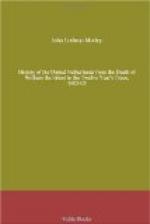The conquerors of Mendoza and deliverers of Bantam had however not paused in their work. From Java they sailed to Banda; and on those volcanic islands of nutmegs and cloves made, in the name of their commonwealth, a treaty with its republican antipodes. For there was no king to be found in that particular archipelago, and the two republics, the Oriental and the Germanic, dealt with each other with direct and becoming simplicity. Their convention was in accordance with the commercial ideas of the day, which assumed monopoly as the true basis of national prosperity. It was agreed that none but Dutchmen should ever purchase the nutmegs of Banda, and that neither nation should harbour refugees from the other. Other articles, however; showed how much farther, the practice of political and religious liberty had advanced than had any theory of commercial freedom. It was settled that each nation should judge its own citizens according to its own laws, that neither should interfere by force with the other in regard to religious matters, but that God should be judge over them all. Here at least was progress beyond the system according to which the Holy Inquisition furnished the only enginry of civilization. The guardianship assumed by Holland over these children of the sun was at least an improvement on the tyranny which roasted them alive if they rejected religious dogmas which they could not comprehend, and which proclaimed with fire, sword, and gibbet that the Omnipotent especially forbade the nutmeg trade to all but the subjects, of the most Catholic king.
In Atsgen or Achim, chief city of Sumatra, a treaty was likewise made with the government of the place, and it was arranged that the king of Atsgen should send over an embassy to the distant but friendly republic. Thus he might judge whether the Hollanders were enemies of all the world, as had been represented to him, or only of Spain; whether their knowledge of the arts and sciences, and their position among the western nations entitled them to respect, and made their friendship desirable; or whether they were only worthy of the contempt which their royal and aristocratic enemies delighted to heap upon their heads. The envoys sailed from Sumatra on board the same little fleet which, under the command of Wolfert Hermann, had already done such signal service, and on their way to Europe they had an opportunity of seeing how these republican sailors could deal with their enemies on the ocean.
Off St. Helena an immense Portuguese carrack richly laden and powerfully armed, was met, attacked, and overpowered by the little merchantmen with their usual audacity and skill. A magnificent booty was equitably divided among the captors, the vanquished crew were set safely on shore; and the Hollanders then pursued their home voyage without further adventures.




